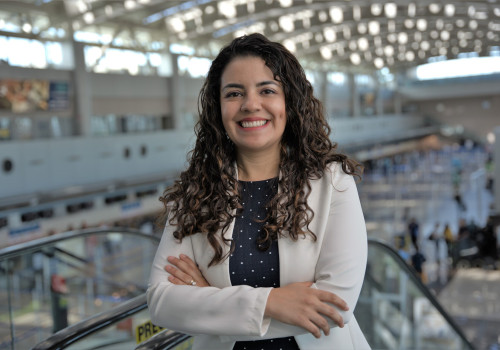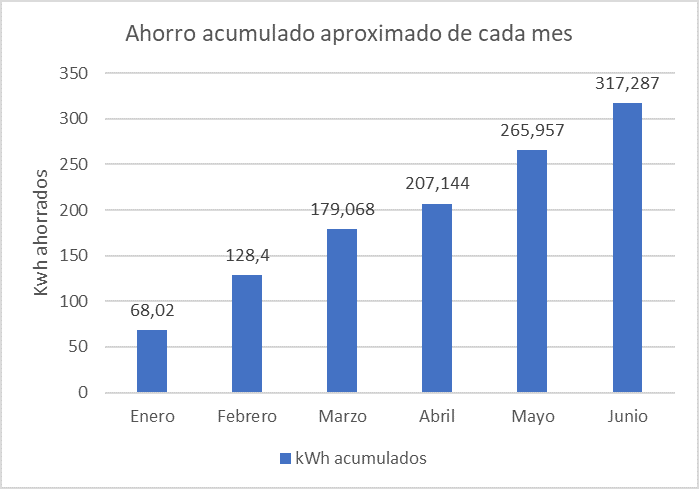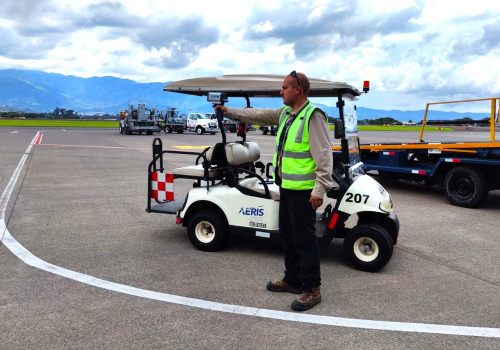Month: September 2023
JUAN SANTAMARÍA AIRPORT ACHIEVES ENERGY SAVINGS WITH 1,200 LIGHTS REPLACED WITH LED TECHNOLOGY

INTECO audit shows AERIS’ commitment to energy efficiency
Juan Santamaría Airport achieves improved energy savings with the replacement of 1,200 lights with LED technology.
- The lights were replaced in the boarding lounges, restrooms, corridors, immigration areas of the arrivals area and baggage claim of the country’s main air terminal.
- In the first half of the year, the reduction in electricity consumption reached 347,120 kWh, equivalent to the monthly electricity consumption of some 1,611 homes.
September, 2023. In its commitment to promote a sustainable airport operation, AERIS, interested manager of the Juan Santamaría International Airport (AIJS), achieved a new advance in energy savings during the first half of 2023 due to the change of 1,200 lights to LED technology.
The replacement of lighting fixtures, carried out between August last year and January 2023, in the boarding lounges, restrooms, corridors, Migration areas of the arrivals area and baggage claim has ensured greater savings, as well as a lower environmental impact by reducing the carbon footprint.

This is what the report of the recent audit of the Technical Standards Institute of Costa Rica (INTECO) states, which indicates that the system of the country’s main air terminal shows a “clear trend of improvement” by reporting an accumulated 347,120 kilowatt hours (kWh), an amount of reduction equivalent to the monthly electricity consumption of about 1,611 homes in Costa Rica, according to AERIS calculations based on the National Energy Balance 2020.
“From AERIS we welcome the result of this audit conducted by INTECO, which allows us to successfully maintain the certification of our Energy Management System based on the INTE/ISO 50001:2018 standard. The sustainability of airport operations is the goal we have set for ourselves, and energy efficiency is a fundamental pillar of this strategy,” said Ricardo Hernández, executive director of AERIS.
Another action that contributed to energy savings was to make an adjustment in the equipment that is responsible for supplying chilled water to the air conditioning at AIJS, in order to optimize its operation.
The audit report also highlights the high level of involvement of all AERIS management levels with respect to the Energy Management System and the improvement of energy performance.
“For this year we will also implement the installation of variable frequency drives (VFD) in the fans of the handlers, which are the ducts where the air conditioning is distributed. In 2024 we will continue with the change of lighting in the main ramp, the use of VFD in electromechanical stairs and the project to automatically turn off LED lights in the lobby, in order to continue generating energy savings,” said Adriana Bejarano, head of Environment, Health and Safety at AERIS.
The variable frequency drives save energy by adjusting the speed of the electric motors to adapt to the demand of the application and improve the efficiency of the system.
Key certification
With INTE/ISO 50001, AERIS is continuing to improve its energy performance. The goal is to accumulate savings of 4.6% between January 2003 and December 2024 compared to the results obtained in 2022. This improvement consists of reducing the electricity consumption of the AIJS main meter by approximately 1,180,000 kWh during the defined period.
“The implementation of an energy management system generates energy efficiency with which decreases greenhouse gas emissions, in addition, the company by consuming fewer resources contributes to reduce the carbon footprint. This commitment to the environment is always noteworthy. We congratulate AERIS for fostering internal communication and awareness, promoting a culture of efficient energy use,” said Manuel Gonzalez, technical coordinator at INTECO.
The AIJS is the first airport of the CCR Group to obtain the INTE/ISO 50001 Energy Management certification by INTECO, and is also one of the pioneer airports in the Latin American and Caribbean region to obtain the recognition, thus contributing to the country’s competitiveness.
This certification represents one of the most effective ways to reduce greenhouse gases, promote the care of natural resources and boost the economy’s productivity.
INTECO performs the conformity assessment of the Energy Management System once a year since 2021, when AERIS obtained the certification for the first time. The certification renewal will take place in 2024.
About AERIS Costa Rica
AERIS HOLDING COSTA RICA is a company of the CCR Group, which operates under the management model interested in the Juan Santamaría International Airport (AIJS), being in charge of its operation, maintenance, rehabilitation, construction, financing and promotion.
The company seeks to exceed the expectations of its stakeholder management contract in a transversal manner to sustainability, generating social, environmental and economic value. AERIS is committed to providing a “Pura Vida” travel experience for passengers transiting through the main gateway to the country and to generate positive impact to Costa Rica and its stakeholders.
AERIS draws on the experience of its parent companies: HAS Development Corporation and Grupo CCR of Brazil, the latter as the main shareholder and with stakes in the international airports of Quito Ecuador, Curacao and Belo Horizonte in Brazil.
It currently connects Costa Rica with 36 destinations around the world, through 25 international commercial airlines and two domestic airlines that operate in its facilities.
COSTA RICA WAS THE DESTINATION FOR A PRESTIGIOUS INTERNATIONAL EVENT ON THE FUTURE OF AVIATION

AERIS was one of the platinum sponsors of IATA Aviation Day Costa Rica
Costa Rica was the destination of a prestigious international event about the future of aviation.
- In its return after four years, Aviation Day Costa Rica convened ministers, aeronautical authorities, embassy representatives, airlines, among others.
- Challenges and opportunities to reach the country’s aviation potential, as well as the importance of the industry for the development of the region were some of the topics discussed at the forum.
September, 2023. After several years of absence, this Tuesday, September 19, Costa Rica once again hosted the IATA Aviation Day, an event that brings together the main executives of the airport and tourism industry, as well as public sector leaders and international experts to interact about the challenges and opportunities of aviation.
“These events are held with the objective of creating a framework for meeting and constructive dialogue to agree on actions that allow the aviation industry to continue to be for Costa Rica, and Central America in general, a strategic partner of social connection and an engine of development,” said David Hernandez, manager Central America, Cuba, Ecuador and Venezuela of the International Air Transport Association (IATA).
IATA, as organizer of Aviation Day, was in charge of welcoming and closing the forum, through Peter Cerdá, its Regional Vice President for the Americas, and David Hernández, its manager for Central America, Cuba, Ecuador and Venezuela.
In front of more than 300 guests, different blocks of conversation focused on the status and potential of a key industry such as aviation, which before the pandemic contributed 155,000 direct and indirect jobs and 9% of the gross domestic product (GDP) of the country.
Ricardo Hernández, executive director of AERIS, manager of Juan Santamaría International Airport and one of the platinum sponsors of Aviation Day, said: “We are pleased that Juan Santamaría International Airport has become an example of the reactivation of the sector. This shows that our mission to exceed the expectations of the Stakeholder Management Contract has constantly led us to ask ourselves what more we can do to contribute to the country’s competitiveness, and these types of forums are relevant to find those answers.”
High standards forum. At around 9:30 am, the first forum entitled: ‘Challenges and priorities for air transportation in Costa Rica’ began, with the participation of Luis Amador, Minister of Public Works and Transportation, and William Rodriguez, Minister of Tourism, among others.
The event continued with topics such as ‘Air connectivity and competitiveness for the development of Central America’, as well as ‘Tourism and aviation: development enhancers in the countries’.
There was also a space called ‘Effective regulation to promote aviation in Costa Rica’, in which Fernando Naranjo, director of Civil Aviation, intervened.
One of the main features of the Aviation Days are the notable panelists participating. Among the international speakers who covered these contents were:
- Adolfo Aragon, Senior Vice President of Universal Weather & Aviation Inc.
- Alicia Lines, Regional Director of Distribution, IATA
- Carlos Granados, general manager of United Airlines
- Dionisio Pérez-Jácome, Vice President, Corporate Development and Sustainability, Volaris
- Eva Felicia Martinez, Ambassador of Spain in Costa Rica
- Francisco Lima-Mena, SIECA Secretary General
- Frederico Pedreira, Deputy CEO, Avianca
- Gustavo Santos, Regional Director, Regional Department for the Americas UNWTO
- Marcela Toriello, Chairman of the Board and CEO TAG Airlines
- Marina Colunga, Iberia’s Commercial Director for Latin America
- Nicholas Reyes, Western Hemisphere Director, Federal Aviation Administration Office of International Affairs
- Roberto Echandi, Investment Policy Leader World Bank
- Ronny Rodríguez, Director of Corporate Development, Volaris
- Viviana Martin, Global Director of Government Relations Avianca
The culmination of the meeting corresponded to a panel called: ‘Operational needs to enhance aviation in Costa Rica’, where the next steps of the industry were presented by Ricardo Hernandez; Camilo Martelo, director of International Airports of Spirit Airlines; Juan Carlos Trabanino, executive director of COCESNA; Cesar Jaramillo, CEO of Coriport and Uriel Torres, director of SITA for Mexico, Central America, Colombia and the Caribbean.
Connection with sustainability. Also within the framework of this event, on September 18, the first Sustainability Meeting was held to evaluate the challenges and opportunities that will enable Costa Rica to become a sustainable tourism destination, and how the travel and tourism sector can contribute to this goal.
Adriana Bejarano, head of Environment, Health and Safety of AERIS participated in the forum on behalf of the AIJS manager, together with specialists from the Airports Council International, IATA, DGAC, among others.
“Airport sustainability is the path we have set for ourselves to operate Juan Santamaría International Airport. We are convinced that the social, environmental and economic action we have taken has already been transcendental, but we want to continue generating a positive impact on our communities, which is why this type of space is essential to achieve this goal,” said Bejarano.
About AERIS Costa Rica
AERIS HOLDING COSTA RICA is a company of the CCR Group, which operates under the management model interested in the Juan Santamaría International Airport (AIJS), being in charge of its operation, maintenance, rehabilitation, construction, financing and promotion.
The company seeks to exceed the expectations of its stakeholder management contract in a transversal manner to sustainability, generating social, environmental and economic value. AERIS is committed to providing a “Pura Vida” travel experience for passengers transiting through the main gateway to the country and to generate positive impact to Costa Rica and its stakeholders.
AERIS draws on the experience of its parent companies: HAS Development Corporation and Grupo CCR of Brazil, the latter as the main shareholder and with stakes in the international airports of Quito Ecuador, Curacao and Belo Horizonte in Brazil.
It currently connects Costa Rica with 36 destinations around the world, through 25 international commercial airlines and two domestic airlines that operate in its facilities.
AERIS PROMOTES USER PARTICIPATION TO GUARANTEE OPERATIONAL SAFETY AT JUAN SANTAMARÍA INTERNATIONAL AIRPORT

- Safety Management System verifies the veracity of reports received on issues such as unsafe driving and abandoned or unattended equipment.
September, 2023. The Operational Safety and Operations teams of AERIS are constantly dedicated to supervise, monitor and resolve potential risks at the Juan Santamaría International Airport (AIJS), but did you know that you can collaborate in guaranteeing the continuity of the normal operation of the country’s main air terminal?
“To enhance the participation of citizens in ensuring PURA VIDA experiences, if a person identifies any potential problem for the air side of AIJS, such as runway, apron, taxiways, among others, you can notify the Operational Safety Management System (SMS) team through the communication channels enabled,” said Ricardo Hernandez, executive director of AERIS, manager of AIJS.
The form can be found at sjoairport.com/aeris/contact us/, openly or anonymously; it should include as many precise details as possible, such as time, place, persons involved, aircraft or equipment registration number. If more information is needed, the managers will request it at the time of the investigation.
These reports are treated with confidentiality by the SMS team, with the purpose of identifying and applying corrective, preventive and mitigating measures. Once received, they follow a staged and thorough process to verify the accuracy of the information submitted.
For example, cameras and frequency recordings are used to validate the accuracy of the reports. Then, if required, a site visit or extraordinary inspection is conducted to mitigate the identified hazard.
Cause of reports. The main issues driving the reports are identified as risky driving, poor communication, and abandoned/unattended/mis-parked equipment.
“It is critical to address these reports if true, as they have a direct impact on the passenger experience. For example, risky driving can cause dangerous situations in transit areas, increasing the risk to users; or poor communication, which can cause confusion and delays, affecting flight punctuality and inconveniencing passengers,” explained Virginia Valverde, AERIS Security and Crisis Management Supervisor.
Meanwhile, abandoned or improperly parked equipment can obstruct critical areas and cause service delays.
The work of the SMS. The tasks of this department involve ensuring the effective and risk-free running of processes that, even in some cases, may go unnoticed by the average passenger, but which are fundamental.
For example, on boarding a flight, in addition to checking identity documents and possible prohibited items, there is a seat assignment to balance the load on the aircraft and consideration of passengers with special needs, while coordinating with the cabin crew and on the tarmac to ensure an orderly and safe flow of passengers.
“While passengers simply hand over their baggage, there is rigorous planning behind how it is stored in the cargo hold to ensure that the weight and distribution does not compromise the stability of the aircraft, that hazardous or prohibited items are not carried, etc. It involves the design of safe loading procedures, training of ground personnel and security measures to prevent incidents,” added Valverde.
Actions also include on-site inspections and supervisions to assess the risk exposure of companies operating on the airside; in particular for those related to ground handling, a risk index is created.
In line with its commitment to continuous improvement, the SMS team provides specialized safety training to both internal AERIS staff and members of the airport community at large.
In addition, various coordinating committees between the various entities that provide services at AIJS (such as the Safety and Facilitation Committee and the Operational Safety Committee) and internal AERIS committees (such as the Safety Action Group) meet in order to provide quality service to users.
About AERIS Costa Rica
AERIS HOLDING COSTA RICA is a company of the CCR Group, which operates under the management model interested in the Juan Santamaría International Airport (AIJS), being in charge of its operation, maintenance, rehabilitation, construction, financing and promotion.
The company seeks to exceed the expectations of its stakeholder management contract in a transversal manner to sustainability, generating social, environmental and economic value. AERIS is committed to providing a “Pura Vida” travel experience for passengers transiting through the main gateway to the country and to generate positive impact to Costa Rica and its stakeholders.
AERIS draws on the experience of its parent companies: HAS Development Corporation and Grupo CCR of Brazil, the latter as the main shareholder and with stakes in the international airports of Quito Ecuador, Curacao and Belo Horizonte in Brazil.
It currently connects Costa Rica with 36 destinations around the world, through 25 international commercial airlines and two domestic airlines that operate in its facilities.
INTERNATIONAL ORGANIZATION RECOGNIZES QUALITY OF PASSENGER EXPERIENCE AT JUAN SANTAMARÍA INTERNATIONAL AIRPORT

- Airports Council International awarded level 3 of the Airport Service Quality (ASQ) Costumer Experience accreditation to Costa Rica’s main air terminal.
September, 2023. The Airports Council International (ACI) recognized Juan Santamaría Airport with level 3 of the Costumer Experience accreditation; the international organization granted this certification thanks to the quality of the passenger travel experience.
By achieving level 3 of the Costumer Experience accreditation, ACI recognizes the commitment of the Juan Santamaría International Airport (AIJS) to improve the passenger travel experience. It is a distinction to the airport’s collaborators for providing passengers with a memorable experience.
“At Juan Santamaría International Airport we are committed to the PURA VIDA experience, we work for a pleasant transit for passengers. Good amenities, excellence in customer service and constant improvement are commitments we work on every day and are recognized with this certification,” said Ricardo Hernandez, executive director of AERIS.
This accreditation developed by ACI is part of its Airport Service Quality (ASQ) program, and is structured on specific goals and objectives that differentiate it from any other award in the area of customer satisfaction. There are five levels of accreditation, and airports are accredited and move up to the next level based on their compliance in eight practices:
- Customer Understanding
- Strategy
- Measurement
- Operational improvement
- Governance
- Airport culture
- Service design / innovation
- Airport community collaboration.
“Level 2 means that the airport is promoting a clear customer experience strategy, and consists of 31 specific requirements. To be considered at level 3, it implies that ACI assesses that the airport has already implemented an advanced customer experience strategy, increasing to 47 the requirements we had to meet,” Hernandez explained.
How was level 3 achieved? AERIS summarizes the achievement of this milestone in five reasons as provided by the ACI when granting the accreditation:
- Reinforcement of the SJO brand “Your Gateway to Pure Life Experience”.
In 2022, “Your Pura Vida Experience Gateway” was implemented, which aims to highlight that AIJS is the gateway to the pura vida experiences offered by the country and that passengers can experience from their passage through the terminal.
- Involvement of the airport community through workshops, training and the Excellence Program.
The Excellence Program aims to integrate and recognize the participation of AIJS commercial subcontractors in an annual program of excellence in the integral management of their business, focused on the three dimensions of sustainability. Its results are notorious, for example, in 2022, 45% of the subcontractors enrolled in the initiative carried out social impact activities in communities near the airport.
It also involves the involvement of public entities and airlines, which have actively participated in improving the passenger experience by supporting the identification and implementation of improvements in airport processes.
- Implementation of service methodology in projects.
Service Design is the methodology used to develop projects with the objective of generating solutions in accordance with the needs and expectations of customers. AERIS has begun to apply it in a project that seeks to streamline, reduce processing times and facilitate processes in general, through the placement of ramps before the x-ray machines.
- Employee training.
The airport community has shown great commitment to improving the AIJS customer experience. Therefore, a series of workshops and trainings have been developed with the collaborators of the different companies and entities that work at the airport, where the participants identify opportunities for improvement and pain points for specific steps of the passenger’s journey through the airport. To date, there have been 30 sessions with the participation of more than 300 employees.
- Strengthening the voice of the customer in the SJO community and more passenger data information.
One of the main tools is ACI’s ASQ survey, which is applied monthly in boarding lounges, and allows us to know the passenger’s perception of the airport’s services and facilities. The quarterly results of this survey are shared with the companies and entities that work at AIJS.
About AERIS Costa Rica
AERIS HOLDING COSTA RICA is a company of the CCR Group, which operates under the management model interested in the Juan Santamaría International Airport (AIJS), being in charge of its operation, maintenance, rehabilitation, construction, financing and promotion.
The company seeks to exceed the expectations of its stakeholder management contract in a transversal manner to sustainability, generating social, environmental and economic value. AERIS is committed to providing a “Pura Vida” travel experience for passengers transiting through the main gateway to the country and to generate positive impact to Costa Rica and its stakeholders.
AERIS draws on the experience of its parent companies: HAS Development Corporation and Grupo CCR of Brazil, the latter as the main shareholder and with stakes in the international airports of Quito Ecuador, Curacao and Belo Horizonte in Brazil.
It currently connects Costa Rica with 36 destinations around the world, through 25 international commercial airlines and two domestic airlines that operate in its facilities.